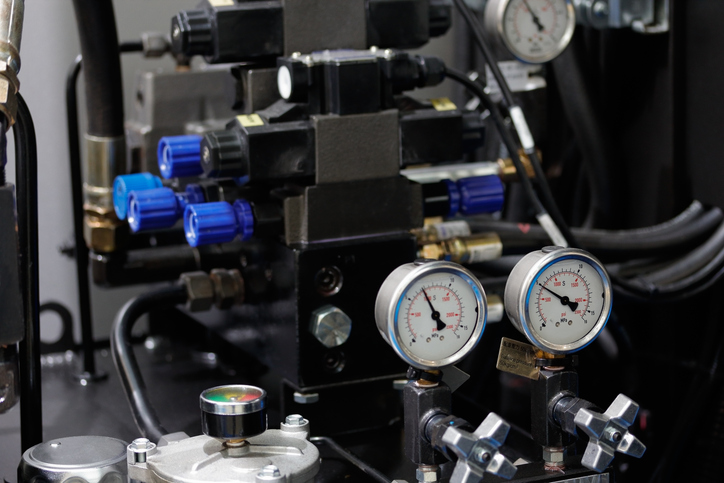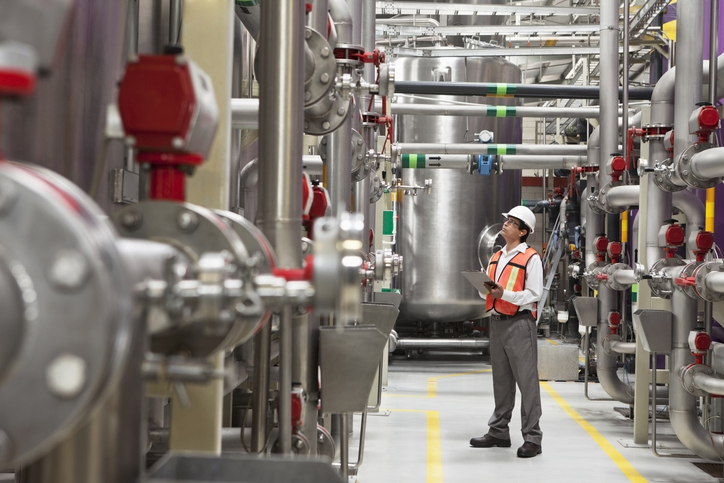As an essential part of the refinement and distillation industry, oil and gas are both keys in the development and production of a wide range of products.
It takes time to mine locations with naturally occurring oil. Some of the staples in expediting the process and making it more simplistic are oil and gas compressors.
If you are familiar with the industry, you’re probably wondering what compressors are used for and how to ensure safety.
In this article, we’ll dive into everything you need to know about an oil and gas compressor. You’ll have the necessary resources to make sure your workplace is safe while getting the job done.
What is an Oil and Gas Compressor?
Before we get into specific safety issues, let’s look at what an oil and gas compressor is.
Compressors are mechanical devices that increase the pressure of gas or oil by reducing its volume. This increases the flow rate in the application process by delivering the oil/gas at a specified pressure.
These machines are relied upon before the product moves throughout the supply chain to the customers expecting it.
Different Kinds of Compressors Employed in the Oil and Gas Sector
Various types of quality compressors are used in the oil and gas sector. There are 2 main categories: rotary and reciprocating compressors.
Rotary Compressors
Rotary Compressors come in two main varieties: rotary blowers and centrifugal compressors. Typically, they feature either wet or dry seal configurations and consist of various components including:
- Housing with integrated flow passages
- A rotating shaft for impeller attachment
- Seals and bearings to prevent gas leakage
Most components of rotary machines remain unchanged, with the exception of the impeller and shaft, which makes them less prone to mechanical inefficiencies when compared to reciprocating compressors. In industrial rotary machines, components like incremental encoders can enhance positioning and motor speed feedback, thereby reducing the need for frequent lubrication and maintenance.
Rotary compressors operate by utilizing mechanical impellers or vanes to draw in low-pressure natural gas and expel it at high pressure, increasing overall pressure. The impeller’s circular motion or centrifugal force boosts gas velocity, which is then directed into a duct section for conversion of velocity energy into static pressure.
It’s important to note that rotary compressors maintain a fixed pressure ratio, resulting in consistent pressure output.
Reciprocating Compressors
Reciprocating compressors exhibit linear motion during the process of increasing natural gas pressure and are commonly employed in the oil and gas industry due to their ability to handle various volume capacities and pressures. Unlike rotary compressors, reciprocating ones have a variable volumetric flow-rate output, albeit with potential limitations. They possess more moving parts, resulting in lower mechanical efficiencies and occasional lubrication requirements for components such as pistons, suction cylinders, cylinder heads, and discharge valves.
Reciprocating compressors can be driven using gas, electric motors, or steam turbine engines instead of the electric motors typically found in rotary machines. Additionally, they operate within specific compression ratio ranges, necessitating careful selection to ensure proper clearance volume and piston displacement within the cylinder.
The Applications of Oil and Gas Compressors in the Oil and Gas Industry
Compressors play a vital role in both small and large-scale mining operations. Consequently, compressor equipment finds diverse applications in the oil and gas industry.

Petroleum Refining
Compressor equipment is essential for meeting governmental regulations mandating a 95 percent compression of natural gas in petroleum. This compression process is crucial before the transportation of petroleum via pipelines to elevate gas pressure levels, thereby initiating catalytic reactions.
Pipeline Transportation
In oilfield facilities, compressors are utilized to uphold or increase gas pressure during transportation through pipelines to suppliers and end consumers. Gas-driven reciprocating compressors are commonly deployed in this context, with operating discharge pressures ranging from 20 to 50 bar and power ratings between 150 to 3,500 kW. Additionally, this process facilitates the treatment of hydrocarbons for impurities like hydrogen sulfide, often reaching levels as high as 6 percent.
Gas Re-Injection
Compressors of oil and gas are employed to enhance pressure in oil reserves and well flow, particularly as they naturally decline over time. Gas lift production techniques utilize compressors to inject gas into oil layers, aiding in crude oil recovery. This re-injection process can utilize air or associated gas, with compressor working pressures typically ranging between 150 to 350 bar. Tandem compressor systems, utilizing both centrifugal and reciprocating compressors, are utilized for re-injection.
Centrifugal compressors initially compress the gas, while reciprocating compressors provide further compression to achieve the desired pressure level. Generally, rotary compressors are preferred in large fields, whereas reciprocating compressor equipment is favored in small to medium-sized fields.
Petrochemical Synthesis
Compressor equipment is indispensable in petrochemical manufacturing processes requiring precise pressurization of air and gas for the synthesis of various compounds such as ammonia, methanol, urea, ethylene, and ethylene glycol. These oil and gas compressors are instrumental in facilitating the production of these essential petrochemicals.
The Future of Compressors for the Oil and Gas Industry
Mining has evolved significantly from traditional methods involving shovels and manual extraction to employing sophisticated machinery for petroleum extraction in oil-rich regions. A burgeoning industry has emerged to provide companies with both new and used mining equipment, including compressor systems.
The ever-growing demand for fossil fuels, driven by consumer needs for powering vehicles, generators, and various mechanical devices, underscores the necessity for compressor equipment to regulate gas pressure in oil fields.
While alternative energy sources may see development, the majority of the population will continue to rely on fossil fuels and non-oil derivatives such as paraffin wax, petroleum jelly, refined bitumen, and microcrystalline wax. Consequently, there’s an anticipated increase in demand for compressor machinery in the coming years.
Intense competition among manufacturers of oil and gas compressors to enhance accessibility and maximize yields will drive the innovation of more advanced compressor systems, facilitating smoother operations and increased productivity in the industry.
Regulations in Place
An oil or gas compressor station implements safety measures and regulatory protocols to prevent potentially dangerous incidents. These stations have built-in shutoff valves to isolate and stop compressors in their tracks, conduct regular testing, and various other checks and balances if something goes wrong.
It’s essential to closely monitor various types of compressors, such as gas turbine compressors and electric compressors, along with other machinery. On-site experts are responsible for ensuring safety protocols are meticulously followed at gas compressor stations.

Regulations have evolved over time to incorporate environmental concerns. Compressor stations are required to adhere to noise level restrictions outlined by the Federal Energy Regulatory Commission (FERC) guidelines.
The FERC regulates noise at 55 decibels.
Because compressor stations use natural gas, emissions are clean. This makes working with oil and gas more environmentally friendly than at first glance.
Understand the Risks
According to the Census of Fatal Occupational Injuries (CFOI), the number of workers who have died in the oil and gas extraction industry varies from year to year.
In recent years, fatalities in the oil and gas extraction industry have been a concern due to the inherent risks associated with the nature of the work, including drilling, exploration, and production activities. Efforts to improve safety standards and practices are ongoing to mitigate these risks and prevent future fatalities.
The health and safety concerns of oil and gas compressor jobs are serious. There’s a variety of concerns when it comes to the job:
- Falls
- Explosions and fires
- Exposure to chemicals
- Vehicle accidents
To eliminate these accidents, resources have been made available to combat hazards in the workplace. If you need assistance identifying, controlling, and limiting exposure to these hazards, read more here.
This information can help save a life and provide additional clarification to the risks of employees involved in these workplaces.
How to Choose an Oil and Gas Compressor?
Choosing the right oil and gas compressor is crucial for ensuring optimal performance and efficiency in your operations.
Criteria for selection:
- Understand your requirements. Begin by clearly defining your requirements. Consider factors such as the volume of gas to be compressed, the pressure levels needed, and the specific applications for which the compressor will be used.
- Type of compressor. There are several types of compressors available, including reciprocating, rotary screw, and centrifugal compressors. Reciprocating compressors are typically used for low to medium-pressure applications, while rotary screw and centrifugal compressors are better suited for higher pressure and larger volume requirements.
- Gas composition. Consider the composition of the gas you’ll be compressing. Some gases may require special materials or components to prevent corrosion or contamination. Ensure that the compressor you choose is compatible with the specific gases you’ll be working with.
- Environmental conditions. Take into account the environmental conditions in which oil and gas compressors will operate. Factors such as ambient temperature, altitude, and humidity can affect the performance and longevity of the equipment. Choose a compressor that is designed to withstand the environmental conditions of your operating environment.
- Efficiency and energy consumption. Energy efficiency is a key consideration, especially in oil and gas operations where energy costs can be significant. Look for compressors that are designed for high efficiency and low energy consumption.
- Reliability and maintenance. Reliability is paramount in oil and gas operations where downtime can result in significant losses. Choose an oil and gas compressor from a reputable manufacturer that is known for producing reliable equipment.
- Compliance and safety. Ensure that the compressor complies with industry standards and regulations for safety and performance. Safety features such as pressure relief valves, temperature sensors, and automatic shutdown systems should also be considered.
- Cost considerations. Investing in a higher-quality compressor upfront may result in long-term cost savings and better performance.
By carefully considering these factors and conducting thorough research, you can select the right oil and gas compressor to meet your specific needs and requirements, ensuring efficient and reliable operation in your operations.
Specialization in Compressor Packages
Safety is extremely important when it comes to compressor stations for gas and oil production. Once you’ve created a system that works, you need a company that capitalizes on the process. GasPro Compression Corp. specializes in low-power compressor packages that comply with the current industry standards. Since 2004, we have been supplying the oil and gas industry with customized solutions to optimize business.
GasPro Compression prioritizes customer satisfaction and provides responsive support throughout the buying process and beyond. From initial consultation to after-sales service and maintenance, buyers can expect prompt assistance and expert guidance from GasPro’s dedicated team.
Maximize your production by optimizing your process. There’s a wide range of products the company supplies to fit your needs. If you have any questions about compressors in the oil and gas industry about our company’s products, give us a call at 403-443-8886.
